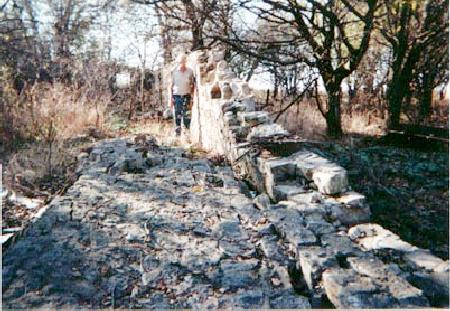|
| |
|
Donna's
Doorways
Renovation
Project |
 |

~Page 9~
"The Stones Will Cry Out"
RENOVATION PROJECT

THE STONE WALL
The BigEagle-Jones Ranch Site
OSAGE COUNTY, OKLAHOMA
 |
 |

|

The Stone Wall
(aka "Lee's Wall")
Lee Otis Jones built this stone wall in about 1942.
He picked up the rock from 80 acres of pasture land,
creating the meadow that exists there now.
Without the rocks to tear up the bailing machines,
a more plentiful supply of rich prairie hay was available.
Lee pried the rocks loose with a pry bar,
and, on foot, carried them in a wheel barrow
to the place where he built the rock wall.
According to a study I did about them,
Rock walls in England and Scotland are protected by law.
The reason for this, is because rock walls change the eco-system
of the area around them. The rocks warm the ground in the
Winter,
holding the day's heat over the cold nights. In Summer,
they act in the opposite way, by holding the cool of the nights
and transferring it by day, keeping the heat down around their
area.
The breaking of the wind allows the growth of the flora,
and provides habitat for the fauna.
It is said that the North side of a rock wall
almost always supports a very peaceful, quiet verdant area,
and this is certainly true of Lee's wall.
 |
Ranch Site Shade Trees

|

When people see these trees, most exclaim,
"Wha-a-a-a-a-t?!"
"This many SHADE TREES?"
"Out here on the PRAIRIE?"
The only explanation
for these beloved prairie-land wonders-of-nature.
is the ecological factor of the Stone Wall.
 |

The Stone Wall
is 100 Feet long.
At one end of it, off the dairy barn, stands a small rock house
once used as a separating room for cream. The dairy barn had
a cement floor with a runway down the middle that could be
cleaned
by a hosing down. This is where the milk cows were housed.
Lee rarely spoke of hating any part of ranch work,
but he really hated this part of the chores.
One can probably understand why, since sometimes,
there were as many as thirty cows to be milked by hand.
Of course, though, he didn't do it alone.
On occasion,
one of the range cattle would have to be milked,
and that was an experience to tell about, according to Lee.
Even with hobbles and a tying down of the cow,
this could still be a harrowing event!
Here was probably the first feed lot in Oklahoma.
There are remnants of a fence Lee built as a runway from the
pasture.
This runway allowed the cattle to be driven into the large
corral,
in front of the hay and dairy barns located on the South side
of the rock wall.
The breaking of the wind
and the warm sun on the wall, provided a warmth for the cattle
that most range animals never experienced.
These cattle were then "full fed" in the small area,
which aided in their not losing so much weight,
as they would have by foraging wide pastures for food.
Their calving in the Spring was easier, and fewer calves were
lost.
By Spring,
most of the herd would be moved back to the pasture,
keeping only the heifers with calves in the feed lot.
This saved the rancher the time and the grief of having to
go out in the pasture when constantly checking to see
if the young heifers were faring well with their calves.
All these things,
Lee engineered, and are expressions of his personality.
Very kind and considerate to humans and animal alike.
Where he learned these things is a mystery.
However, he was an avid reader. He was a thinker.
It may have been that some of the knowledge was passed down to
him
from a grandfather, or maybe from his own father, Joe.
At any rate, this very small ranching operation paid off well
enough
to keep the whole family, his own and extended.
Lee may have read about the rock walls of Scotland,
but the difference being, his was not dry wall.
He used mortar to build it.
He must not have had the skill or ability to build a dry wall.
Today, it is said to be a dying art in Europe.
There is a society trying to continue the skill,
with membership here in America.

In the above photo, Rodney Flood stands beside the wall,
to indicate the height of it. Rodney is 6'-3" tall.
Part of the wall has been pushed over.
Daddy, Lee Otis, had a fond saying,
"They say ignorance is a bliss, but danged if I believe
it."
In communicating with a Stewart, family name, in Scotland
recently,
I felt a closeness with my father again. The gentleman said,
"I haven't had the opportunity to research the Scottish
people of
America regarding their building of rock walls. You see,
I keep coming up against . . . a stone wall!"
What fun that conversation was!
So, I'm reassured, the culture, the fiber, that intrinsic something
remains and it cannot be taken away.
 |
|
|

